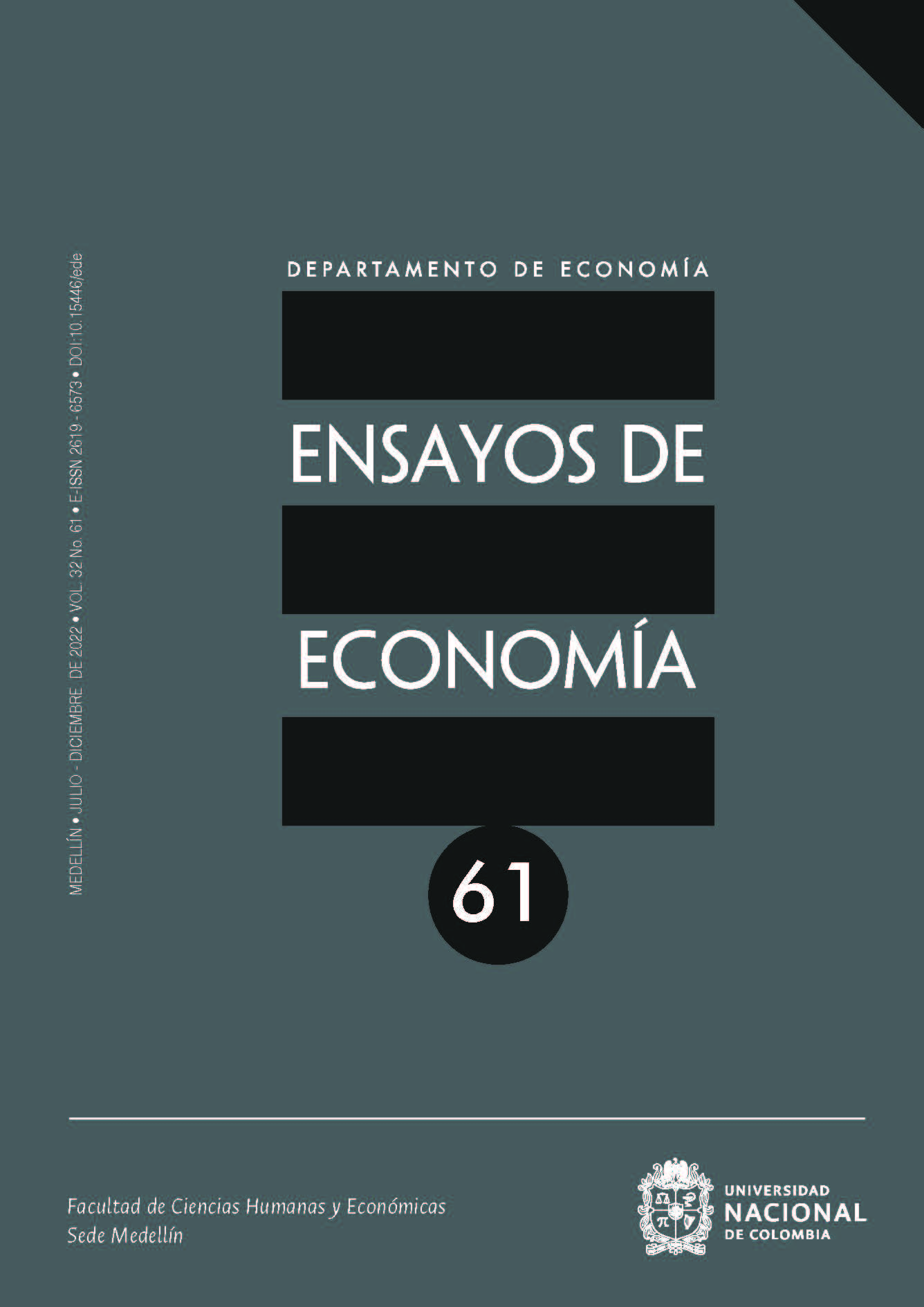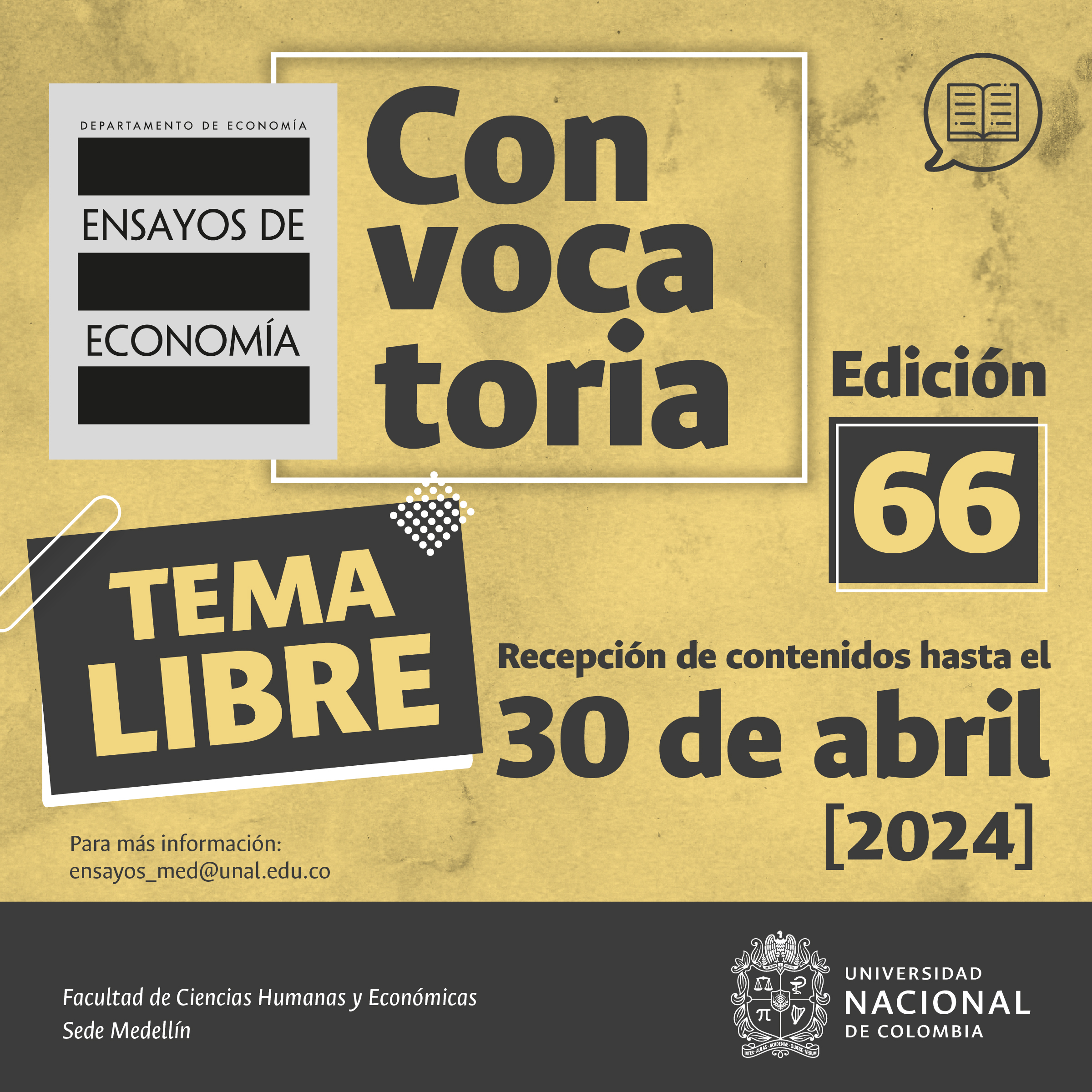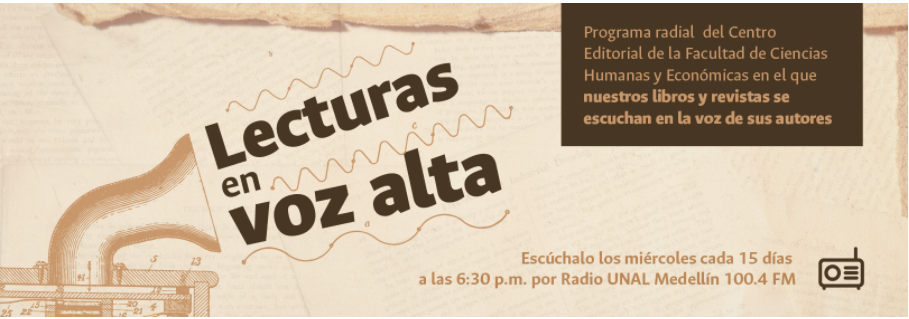Global Inequality in the Current Era
Desigualdad global en la era actual
DOI:
https://doi.org/10.15446/ede.v32n61.97281Palabras clave:
Inequality, International Economics, Economic Impacts of Globalization, International Economic Order (en)desigualdad, globalización, política económica (es)
Descargas
One of the most vehement criticisms to the current global era refers to the issue of huge income disparities within and between countries. At present, global inequality is higher than it was 200 years ago but, at the same time, up to COVID 19, the Gini index marks the first time since the Industrial Revolution that it stopped rising. This downward trajectory has been driven by a decline in between-country inequality —the main explanatory factor for global income disparities— partially offset by a rise in within-country inequality. The downward trend between countries should not be unexpected, since low-income countries in Asia, particularly China, have experienced growth rates substantially above the world average in the context of a rapid industrialization process. The pandemic has revealed and worsened preexisting inequalities in both within and between countries, so that global inequality also appears to have increased since its outbreak.
Una de las críticas más vehementes a la actual era global se refiere a la cuestión de las enormes disparidades de ingresos dentro de los países y entre ellos. En la actualidad, la desigualdad mundial es mayor que hace 200 años, pero, al mismo tiempo, hasta el COVID 19, el índice de Gini marca la primera vez desde la Revolución Industrial que dejó de aumentar. Esta trayectoria descendente se ha visto impulsada por un descenso de la desigualdad entre países —el principal factor explicativo de las disparidades de ingresos a nivel mundial— parcialmente compensado por un aumento de la desigualdad dentro de los países. La tendencia a la baja entre países no debería ser inesperada, ya que los países de bajos ingresos de Asia, especialmente China, han experimentado tasas de crecimiento sustancialmente superiores a la media mundial en el contexto de un rápido proceso de industrialización. La pandemia ha revelado y agravado las desigualdades preexistentes tanto dentro de los países como entre ellos, de modo que la desigualdad mundial también parece haber aumentado desde su estallido.
Referencias
Abramovitz, M. (1986). Catching Up, Forging Ahead, and Falling Behind. The Journal of Economic History, 46(2), 385-406. https://www.jstor.org/stable/2122171 DOI: https://doi.org/10.1017/S0022050700046209
Acemoglu, D., Johnson, S., & Robinson, J.A. (2001). Reversal of Fortune: Geography and Institutions in the Making of the Modern World Income Distribution [National Bureau of Economic Research Working Paper No. 8460]., NBER. https://www.nber.org/papers/w8460 DOI: https://doi.org/10.3386/w8460
Alderson, A.S., & Nielsen, F. (2002). Globalization and the Great U-Turn: Income Inequality Trends in 16 OECD Countries. American Journal of Sociology, 107(5), 1244–1299. https://doi.org/10.1086/341329 DOI: https://doi.org/10.1086/341329
Arcand, J. L., Berkes, E., & Panizza, U. (2012). Too Much Finance? International Monetary Fund Working Paper Nº 12/161, 1-49. Downloaded from https://www.imf.org/external/pubs/ft/wp/2012/wp12161.pdf. DOI: https://doi.org/10.5089/9781475504668.001
Astorga, P. (2017). Functional Inequality in Latin America: News from the Twentieth Century. In L. Bertola & J. Williamson (eds.) Has Latin American Inequality Changed Direction? (17-42). Springer. DOI: https://doi.org/10.1007/978-3-319-44621-9_2
Autor, D., Dorn, D., & Hanson, G.H. (2016). The China Shock: Learning from Labor-Market Adjustment to Large Changes in Trade. Annual Review of Economics, 8, 205–240, https://doi.org/10.1146/annurev-economics-080315-015041 DOI: https://doi.org/10.1146/annurev-economics-080315-015041
Baumol, W. J. (1986). Productivity Growth, Convergence, and Welfare: What the Long-Run Data Show. The American Economic Review, 76(5),1072-1085. http://www.jstor.org/stable/1816469
Bergh, A., & Nilsson, T. (2010). Do Liberalization and Globalization Increase Income Inequality? European Journal of Political Economy, 26(4), 488-505. https://doi.org/10.1016/j.ejpoleco.2010.03.002 DOI: https://doi.org/10.1016/j.ejpoleco.2010.03.002
Berry, A. (1997). The Income Distribution Threat in Latin America, Latin American Research Review, 32 (2), 3-40. http://www.jstor.org/stable/2503865 DOI: https://doi.org/10.1017/S0023879100037833
Bértola, L. & Ocampo, J.A. (2012). The Economic Development of Latin America since Independence. Oxford University Press. DOI: https://doi.org/10.1093/acprof:oso/9780199662135.001.0001
Bértola L. & Williamson J. (2017). Has Latin American Inequality Changed Direction? Springer. DOI: https://doi.org/10.1007/978-3-319-44621-9
Bourguignon, F., & Morrison, Ch. (2002). Inequality Among World Citizens: 1820–1992. The American Economic Review, 92(4), 727-744. https://doi.org/10.1257/00028280260344443 DOI: https://doi.org/10.1257/00028280260344443
Bourguignon, F. (2015). The Globalization of Inequality. Princeton University Press. DOI: https://doi.org/10.1515/9781400865659
Busso, M., & Messina, J. (2020). Overview: Fractured Societies. In M. Busso & J. Messina (eds.), The Inequality Crisis Latin America and the Caribbean at the Crossroads (1-36). Inter-American Development Bank. DOI: https://doi.org/10.18235/0002629
Case, A., & Deaton, A. (2020). Deaths of Despair and the Future of Capitalism. Princeton University Press. DOI: https://doi.org/10.1515/9780691217062
Caselli, F., & Coleman II, W.J. (2001). Cross-Country Technology Diffusion: The Case of Computers. The American Economic Review, 91 (2), 328-335. https://www.jstor.org/stable/2677783 DOI: https://doi.org/10.1257/aer.91.2.328
Clark, R. (2019). The Goldilocks Effect: Convergence in National Income Distributions, 1990–2015. Social Science Research, 79,141-159. https://doi.org/10.1016/j.ssresearch.2019.01.003 DOI: https://doi.org/10.1016/j.ssresearch.2019.01.003
Coatsworth, J.H. (2005). Structures, Endowments, and Institutions in the Economic History of Latin America. Latin American Research Review, 40 (3), 126-144. https://doi.org/10.1353/lar.2005.0040 DOI: https://doi.org/10.1353/lar.2005.0040
Deaton, A. (2021). COVID-19 and Global Income Inequality [National Bureau of Economic Research Working Paper No. 2839]. NBER. https://www.nber.org/system/files/working_papers/w28392/revisions/w28392.rev0.pdf DOI: https://doi.org/10.3386/w28392
Deaton, A., & Schaeffer, L. (2021). Covid 19 and Global Income Inequality [Working paper version 3]. http://www.princeton.edu/~deaton/downloads/International%20income%20inequality%20and%20the%20COVID%20%20v3%20Feb%2010%20figures.pdf
de Haan, J., & Sturm, J.E. (2017). Finance and income inequality: A review and new evidence. KOF Swiss Economic Institute Working Paper Nº 410, 1-40. DOI: http://dx.doi.org/10.3929/ethz-a-010706109. DOI: https://doi.org/10.2139/ssrn.2858830
Dollar D., Kleineberg, T., & Kraay, A. (2016). Growth Still is Good for The Poor. European Economic Review 81, 68-85. https://doi.org/10.1016/j.euroecorev.2015.05.008 DOI: https://doi.org/10.1016/j.euroecorev.2015.05.008
Easterly, W. (2002). The Lost Decades: Developing Countries' Stagnation in Spite of Policy Reform 1980-1998. Journal of Economic Growth, 6 (2), 135-157. https://www.jstor.org/stable/40215870 DOI: https://doi.org/10.1023/A:1011378507540
ECLAC (2021). Social Panorama of Latin America. ECLAC. https://www.cepal.org/en/publications/47719-social-panorama-latin-america-2021
Eichengreen, B. (2008). Globalizing Capital: a history of the international monetary system. Princeton. Princeton University Press. DOI: https://doi.org/10.2307/j.ctt7pfmc
Feenstra, R.C., & Hanson, G.H. (1997). Foreign Direct Investment and Relative Wages: Evidence from Mexico’s Maquiladoras. Journal of International Economics, 42 (3–4), 371–393. https://doi.org/10.1016/S0022-1996(96)01475-4 DOI: https://doi.org/10.1016/S0022-1996(96)01475-4
Ferreira, F.H.G. (2021). Inequality in the Time of Covid 19. Finance and Development, 58 (2), 20-23. https://www.imf.org/external/pubs/ft/fandd/2021/06/pdf/inequality-and-covid-19-ferreira.pdf
Ferreira, F.H.G., Sterck, O., Mahler, D., & Decerf, B. (2021) Death and Destitution: The Global Distribution of Welfare Losses from The COVID-19 Pandemic [International Inequality Institute Working Paper No. 65]. http://eprints.lse.ac.uk/110480/2/Ferreira_death_and_destitution_published.pdf DOI: https://doi.org/10.1596/1813-9450-9673
Firebaugh, F. (2003). The New Geography of Global Income Inequality. Hardvard University Press. DOI: https://doi.org/10.4159/9780674036895
Firebaugh, G., & Goesling, B. (2004). Accounting for the Recent Decline in Global Income Inequality. American Journal of Sociology, 110(2), 283-312. https://doi.org/10.1086/421541 DOI: https://doi.org/10.1086/421541
Gasparini, L. (2019). La desigualdad en su laberinto: hechos y perspectivas sobre desigualdad de ingresos en América Latina [CEDLAS working paper No. 256]. CEDLAS. http://sedici.unlp.edu.ar/handle/10915/87396
Goldin, C., & Katz, L.F. (2008). The Race between Education and Technology. The Belknap Press of Harvard University Press.
Gopinath, G. (2021). Averting a Great Divergence. Finance and Development, 58 (1), 36-37. https://www.imf.org/external/pubs/ft/fandd/2021/03/pdf/averting-a-great-divergence-gopinath.pdf
Grieco, J.M., & Ikenberry, G.J. (2003). State Power and World Markets. Norton.
Griffith-Jones, S. (1996). International Capital Flows to Latin America. In V. Bulmer Thomas (ed.) The New Economic Model in Latin America and its Impact on Income Distribution and Poverty, (127-143). St. Martin's Press. DOI: https://doi.org/10.1007/978-1-349-24520-8_6
Hardoon, D. (2015). Wealth: Having It All and Wanting More. Oxfam International. https://doi.org/10.21201/2015.7955 DOI: https://doi.org/10.21201/2015.7955
Haughton, J., & Khandker, S.R. (2009). Handbook on Poverty and Inequality. The World Bank.
Hung, H.F., & Kucinskas, J. (2011). Globalization and Global Inequality: Assessing the Impact of the Rise of China and India, 1980-2005. American Journal of Sociology, 116 (5), 1478-1513. https://doi.org/10.1086/657456 DOI: https://doi.org/10.1086/657456
Ikenberry, G.J. (2018). The End of Liberal International Order? International Affairs, 94(1), 7–23. https://doi.org/10.1093/ia/iix241 DOI: https://doi.org/10.1093/ia/iix241
IMF. (2007). World Economic Outlook Globalization and Inequality. https://www.elibrary.imf.org/view/books/081/07982-9781589066885-en/07982-9781589066885-en-book.xml
Inter-American Development Bank (1997). Latin America after a Decade of Reforms. Inter-American Development Bank.
Korzeniewicz, R.P., & Moran, T.P. (2009). Unveiling inequality. Russell Sage Foundation.
Korzeniewicz, R.P. & Albrecht, S. (2013). Thinking Globally About Inequality and Stratification: Wages Across the World, 1982–2009. International Journal of Comparative Sociology, 53(5-6), 419-443. https://doi.org/10.1177/0020715212474286 DOI: https://doi.org/10.1177/0020715212474286
Korzeniewicz, R.P., & Albrecht, S. (2016). Income Differentials and Global Migration in The Contemporary World-economy. Current Sociology Monograph, 64(2), 259-276. https://doi.org/10.1177/0011392115614788 DOI: https://doi.org/10.1177/0011392115614788
Kristal, T. (2010). Good Times, Bad Times: Postwar Labor’s Share of National Income in Capitalist Democracies. American Sociological Review, 75(5), 729–763. https://doi.org/10.1177/0003122410382640 DOI: https://doi.org/10.1177/0003122410382640
Kristal, T. (2013). The Capitalist Machine: Computerization, Workers’ Power, and the Decline in Labor’s Share within U.S. Industries. American Sociological Review, 78(3), 361-389. https://doi.org/10.1177/0003122413481351 DOI: https://doi.org/10.1177/0003122413481351
Krueger, A. (2002, September 26). Supporting Globalization [Speech]. Remarks at the 2002 Eisenhower National Security Conference on "National Security for the 21st Century: Anticipating Challenges, Seizing Opportunities, Building Capabilities". https://www.imf.org/en/News/Articles/2015/09/28/04/53/sp092602a
Krugman, P.R., Obstfeld, M., & Melitz, M.J. (2012). International Economics Theory and Practice. Addison-Wesley.
Kuznets, S. (1955). Economic Growth and Income Inequality. The American Economic Review, 45(1), 1-28. http://links.jstor.org/sici?sici=0002-8282%28195503%2945%3A1%3C1%3AEGAII%3E2.0.CO%3B2-Y
Kwon, R. (2016). A New Kuznetsian Dynamic: The Knowledge Economy and Income Inequality in the United States, 1917–2008. The Sociological Quarterly, 57(1), 174-204. https://doi.org/10.1111/tsq.12106 DOI: https://doi.org/10.1111/tsq.12106
Lakner, Ch. (2019). A Global View of Inequality [presentation]. https://thedocs.worldbank.org/en/doc/792141568662759167-0050022019/original/WorldBankSep2019Lakner2public.pdf
Lin, S.C., Kim, D.H., & Lee, Y.H. (2015). Financial Development and the FDI-Inequality Nexus. Contemporary Economic Policy, 33(3), 513–534. https://doi.org/10.1111/coep.12085 DOI: https://doi.org/10.1111/coep.12085
López, H. & Perry, G. (2008). Inequality in Latin America: Determinants and Consequences [World Bank Policy Research Working Papers No. 4504]. https://doi.org/10.1596/1813-9450-4504 DOI: https://doi.org/10.1596/1813-9450-4504
Lustig, N. (2020). Inequality and Social Policy in Latin America. Commitment of Equity Institute Working Paper Nº 94. Downloaded from http://repec.tulane.edu/RePEc/ceq/ceq94.pdf
Maddison, A. (2006). The World Economy. OECD Development Centre Studies. OECD. DOI: https://doi.org/10.1787/9789264022621-en
Maddison, A. (2008). The West and the Rest in the World Economy: 1000–2030. World Economics, 9 (4), 75-100. https://citeseerx.ist.psu.edu/viewdoc/download?doi=10.1.1.546.9890&rep=rep1&type=pdf.
Milanovic, B. (2006). Global Income Inequality: What it is and Why it Matters? [DESA Working Paper No. 26]. United Nations Department of Economic and Social Affairs. https://www.un.org/esa/desa/papers/2006/wp26_2006.pdf DOI: https://doi.org/10.1596/1813-9450-3865
Milanovic, B. (2016). Global Inequality. The Belknap Press of Harvard University. DOI: https://doi.org/10.4159/9780674969797
Milanovic, B. (2019). Capitalism Alone. The Belknap Press of Harvard University. DOI: https://doi.org/10.4159/9780674242852
Milanovic, B. (2021, May 19). Global Inequality [Blog]. http://glineq.blogspot.com/2021/05/notes-on-global-income-inequality-non.html
Neckerman, K., & Torche F. (2007). Inequality: Causes and Consequences, Annual Review of Sociology, 33. 335-357. https://doi.org/10.1146/annurev.soc.33.040406.131755 DOI: https://doi.org/10.1146/annurev.soc.33.040406.131755
Olson, M. (1982). The Rise and Decline of Nations. Yale University Press.
Piketty, T. (2014). Capital in the Twenty First Century. The Belknap Press of Harvard University Press. DOI: https://doi.org/10.4159/9780674369542
Prados de la Escosura, L. (2007). Inequality and Poverty in Latin America: A Long-Run Exploration. In T. J. Hatton, K. H. O’Rourke, & A. M. Taylor (ed.), The New Comparative Economic History (291-315). MIT Press. http://hdl.handle.net/10016/4680
Prebisch, R. (1986). El desarrollo económico de la América Latina y algunos de sus principales problemas. Desarrollo Económico, 26(103) 479-502. https://doi.org/10.2307/3466824 DOI: https://doi.org/10.2307/3466824
Pritchett, L. (1997). Divergence, Big Time. Journal of Economic Perspectives, 11(3), 3–17. https://doi.org/10.1257/jep.11.3.3 DOI: https://doi.org/10.1257/jep.11.3.3
Rodrik, D. (2016). Is Global Equality the Enemy of National Equality? [HKS Working Paper No. RWP17-003]. https://dx.doi.org/10.2139/ssrn.2910603 DOI: https://doi.org/10.2139/ssrn.2910603
Rodrik, D. (2019). Globalization’s Wrong Turn. Foreign Affairs, 98(4), 25-33. https://www.foreignaffairs.com/articles/united-states/2019-06-11/globalizations-wrong-turn
Sala-i-Martin, X. (2006). The World Distribution of Income: Falling Poverty and… Convergence, Period. The Quarterly Journal of Economics, 121 (2), 351–397. https://doi.org/10.1162/QJEC.2006.121.2.351 DOI: https://doi.org/10.1162/qjec.2006.121.2.351
Sánchez-Ancochea, D. (2021). The Costs of Inequality in Latin America. I.B.Tauris. DOI: https://doi.org/10.5040/9781838606275
Sen A. (2000). Development as Freedom. Knopf Inc.
Sokoloff, K.L., & Engerman, S.L. (2000). Institutions, Factor Endowments, and Paths of Development in the New World. Journal of Economic Perspectives, 14 (3), 217-232. https://doi.org/10.1257/jep.14.3.217 DOI: https://doi.org/10.1257/jep.14.3.217
Spence, M. (2011). The Impact of Globalization on Income and Employment: The Downside of Integrating Markets. Foreign Affairs, 90(4), 28-41. https://www.jstor.org/stable/23039604
Stiglitz, J.E. (2015). Inequality and Economic Growth. The Political Quarterly, 86(1), 134-155. https://doi.org/10.1111/1467-923X.12237 DOI: https://doi.org/10.1111/1467-923X.12237
Stiglitz, J.E. (2020). Conquering the Great Divide. Finance and Development, 57(3), 17-19. https://www.elibrary.imf.org/view/journals/022/0057/003/article-A005-en.xml
Thorp, R. (1998). Progress, Poverty and Exclusion: An Economic History of Latin America in the 20th Century. Inter-American Development Bank.
Tinbergen, J. (1974). Substitution of Graduate by other Labour. Kyklos, 27(2), 217-226 https://doi.org/10.1111/j.1467-6435.1974.tb01903.x DOI: https://doi.org/10.1111/j.1467-6435.1974.tb01903.x
Tinbergen, J. (1975). Income Distribution: Analysis and Policies. Elsevier
UNCTAD. (2012). Trade and Development Report. Policies for Inclusive and Balanced Growth. https://unctad.org/system/files/official-document/tdr2012_en.pdf
United Nations (UN). (2020). World Social Report. Inequality in a Rapidly Changing World. United Nations Department of Economic and Social Affairs. https://www.un.org/development/desa/dspd/wp-content/uploads/sites/22/2020/02/World-Social-Report2020-FullReport.pdf
Wade, R.H. (2004). Is Globalization Reducing Poverty and Inequality? International Journal of Health Services, 34(3), 381-414. https://www.jstor.org/stable/45132218 DOI: https://doi.org/10.2190/G8F1-01FL-MEDW-JVG1
World Bank (2001), World Development Report 2000/2001: Attacking Poverty. World Bank. https://openknowledge.worldbank.org/handle/10986/11856
Cómo citar
APA
ACM
ACS
ABNT
Chicago
Harvard
IEEE
MLA
Turabian
Vancouver
Descargar cita
Licencia

Esta obra está bajo una licencia internacional Creative Commons Atribución-NoComercial-SinDerivadas 4.0.
Se autoriza la reproducción sin ánimo de lucro de los materiales, citando la fuente.


























